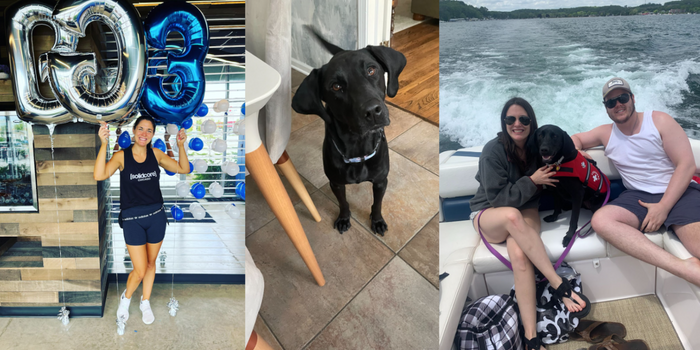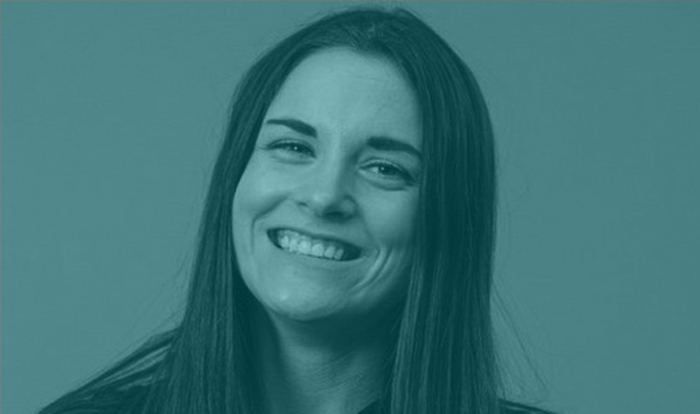How did you hear about SalientMG and why did you decide to join the firm?
I was doing production work for multimedia, had gotten into integrated marketing and found myself in an events marketing role. I’m a writer first and foremost, and found I really missed it. After searching on LinkedIn I saw this position and loved how SalientMG describes the team as “senior doers.” I liked being someone who executed the work in addition to formulating the strategies so I was excited when Salient reached out to me. We talked about my in-house experiences and what was needed for this role. There was a nice organic flow to the conversation; it felt like a good fit.
Describe your role and what you’re most looking forward to in your position.
My role is to think about the most compelling and effective ways to tell client stories and help them articulate their message. It’s really looking at where there might be opportunities to fill any gaps. There’s a lot of getting to know who our clients are so I can help move them closer to what they’re trying to achieve.
After gathering information about their audience, goals, and coming up with the content plan, it then comes down to the writing. I love producing longer content, but have learned to allocate time for editing. Through that, I’ve come to appreciate how to create shorter content that’s also engaging and compelling. In both cases, it’s about figuring out how to make every word count.
Given your role, what is your personal philosophy about the purpose and power of content marketing in growing or moving a brand forward?
Content marketing can make a huge difference in building brand awareness that goes even beyond your primary audience. SMG’s clients are now competing against some big tech companies for the best of the best in talent. I might be a bit biased as a content marketer, but strong content, whether that’s a website, blog post, video—indicates a company has it together. Perception makes a critical difference in moving a brand forward with either a potential client or a potential employee. Where people tend to fall short with content marketing is in not thinking holistically. Instead of leading with the asset, I like to think about the challenge first, then the audience, then determine what kind of assets will help you overcome that challenge. You need to spend as much time thinking about where and how the content is published as you do in generating it.
We know you’re a committed storyteller, but for organizations that don’t currently practice active storytelling, what’s one tip you would share on how to introduce it into their content?
Think about it in terms of humans talking to humans. Sometimes there’s a place for content that speaks to “this saves you X amount of time or X number of dollars.” But, when it comes to storytelling I’d encourage people to take a step back and go deeper. Ok, if you saved someone two hours with your technology, what does that time mean to them? Is it more time for a hobby? Is it a game-changer for a mom who’s always missed her child’s soccer games because she didn’t have those two hours before? Really think about how telling those stories helps someone relate to you. Whether it’s a case study, blog post, or some other form of content, you should weave in the human element to resonate better with audiences.
What is the best piece of advice someone gave you and how has it impacted your personal and/or professional direction?
I had a great manager in a company where feedback was a big part of the culture. In one of our reviews, she acknowledged my ability to create good content, but suggested I slow down from action mode to think more about overall content strategy. It’s advice I took time to digest and take to heart. I realized I was moving way too quickly professionally and personally. For me it was always, What’s the next thing? How much can I get done each day? The pandemic also caused me to slow down a lot. Now I meditate in the morning, I always take my dog, Corky, on a walk. I find I need that time for myself to really be grounded and more structured in how I approach what I do. Being calm and collected has not only helped me produce better work, but to be happier overall.
SalientMG specializes in helping growth-stage technology companies. Real tech talk here–how would you describe your everyday technological prowess?
I love technology. I have type 1 diabetes, so I’ve seen how technology has changed the way I manage this disease. It makes all the difference in the world. Healthcare technology has really helped people live better quality lives, but I think for technology in general it’s just really cool to watch its transformation and how quickly things are happening. It can completely alter the way someone approaches their day, so I love writing about it. As I’ve learned to slow down, I’m becoming more patient with learning the ins and outs of technology so I can do things myself–I’m not as easily frustrated and don’t need to ask people for help as often.
What is one thing your colleagues don’t know about you (yet)?
I’m a coach at [solidcore]. It’s a high-intensity, low-impact full-body strength training workout that started as a hobby and now I really love it. The workout really fosters the practice of mind-body connection, so I dig it. I’ve been leading classes for a few months now, either on the weekends or a few times during the week in off hours.


